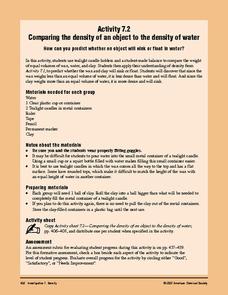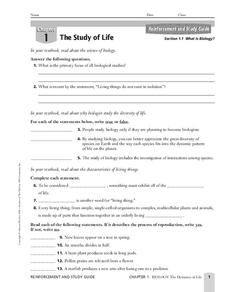American Chemical Society
Preparation and Combustion of Biodiesel
The United States is the world's largest producer of biofuel. During an in-class investigation, young scientists produce their own biodiesel. They burn a sample of it to determine the heat of combustion. Then they discuss the...
California Academy of Science
Kinesthetic Astronomy: Birthday Stars
Space explorers take a virtual trip around the sun right within your classroom! They stand in a circle facing away from the "sun" (a lamp) in the center of the room. As they move according to your instructions, they view different...
Baylor College
Why Circulate?
Lub-dub, lub-dub. Why does the heart beat? Why does blood circulate throughout the body? Life scientists find out how important circulation is for dissolving and dispersing materials by timing how long it takes for food coloring spread...
Howard Hughes Medical Institute
The Making of the Fittest: The Birth and Death of Genes
Adaptations must be made as environments change. This fabulous presentation features Icelandic icefish, a transparent, scaleless specimen that even has colorless blood. Genetics and adaptations concepts are explored as scientists study...
National Wildlife Federation
Quantifying Land Changes Over Time in Areas of Deforestation and Urbanization
Is qualitative or quantitative research more convincing when it comes to climate change? In the eighth lesson during this 21-part series, scholars begin by performing a quantitative analysis of deforestation and urbanization. Then, they...
Columbus City Schools
To Measure its Mass or Volume?
Atoms, elements, and molecules, oh my! Teaching the fundamentals of chemistry to curious sixth graders has never been easier to accomplish. Here is a resource that pulls together everything needed to get them off to a good start,...
California Academy of Science
Kinesthetic Astronomy: Earth's Rotation
After completing the activity, "Kinesthetic Astronomy: The Meaning of a Year," zoom in on Earth's rotation using the same simulation setup and this outline. Each class member dons a map of the Western Hemisphere and plays the part of...
National Energy Education Development Project
Introduction to Wind Energy
The U.S. produced enough wind energy in 2015 to power all of the homes in Alaska, California, Delaware, the District of Columbia, Hawaii, Idaho, Maine, Montana, Nebraska, New Hampshire, North Dakota, Rhode Island, South Dakota, and...
Kenan Fellows
Sustainability: Learning for a Lifetime – Soil
Do great gardeners really have green thumbs—or just really great soil? Environmental scholars discover what makes Earth's soil and soil quality so important through research and experimentation. Learners also develop an understanding of...
American Chemical Society
Dissolving a Substance in Different Liquids
Second of six lessons in a unit on dissolving, this one focuses on how sugar behaves in different liquids. Learners stir it into water, alcohol, and oil and make observations. This lesson can stand alone, but is best used as part of the...
American Chemical Society
Comparing the Density of an Object to the Density of Water
Investigators construct a makeshift balance and compare equal volumes of wax and water. They do the same for clay and water. Then they discover whether the wax and clay will float or sink in water. Ultimately this is a comparison of...
Astronomical Society of the Pacific
Toilet Paper Solar System
Can we model how large the solar system really is? Attempt an astronomical feat with a hands-on-activity that uses a roll of toilet paper. Young scientists measure the distances of the planets from the sun to create a scale model of...
American Chemical Society
Forming a Precipitate
Can you mix two liquids to make a solid that is insoluble? Yes, you can, and pupils see this as the lesson uses more than one combination of liquids to form a solid. Through two teacher demonstrations and a hands-on activity,...
Curated OER
Grow an Alum Crystal
What an exciting lab experiment to conduct with your high school chemistry class! Crystals are formed naturally in the environment. However, allow your blossoming chemists to create their own unique crystals using alum and...
Science 4 Inquiry
A Whole New World: The Search for Water
Scholars find Earth won't support humans much longer and need to identify a planet with water to inhabit. They test four unknown samples and determine which is the closest to water. Then they explain and defend their results.
SeaWorld
Animal Migrations
Here is a fabulous set of activities for your young scientists. Each lesson contains map, hands-on, and game activities that will help the class understand why and how animals migrate from one place to another. First they'll examine the...
Curated OER
What is Biology?
In this science of biology instructional activity, students will review the concepts relating to biology including the characteristics of living things, the process of reproduction, adaptations, and evolution. This instructional activity...
Curated OER
What is Genetics?
In this biology worksheet, 9th graders name two forms of the trait for seed shape observed by Mendel. Then they determine the percentage of the possible types of offspring that have the same genotype as the parents. Students also explain...
Curated OER
What is Classification?
In this classification instructional activity, students describe the difference between Homo erectus and Homo sapiens. Then they define taxonomy and explain what was wrong with Aristotle's method of classification. Students also describe...
Curated OER
Topics in Environmental Science
Students discover topics in environmental science. In this science lesson plan, students build a model to simulate the greenhouse effect and analyze and interpret data, especially the results of introducing pollutants into nature.
Curated OER
Science - What do living things need?
In this living things instructional activity, students answer questions that ask what living things need. Students answer 10 questions in the true and false and short answer format.
Curated OER
What is a Compound Machine?
In this compound machine worksheet, students review what simple machines are put together to make compound machines. This worksheet has 5 fill in the blank and 2 short answer questions.
Curated OER
What is Magnetism?
In this magnetism worksheet, learners review what magnetism is by matching 5 words to their definitions. Then students use a diagram showing the pattern of iron fillings around magnets to complete 4 short answer questions.
Curated OER
What is a Magnet?
In this magnet worksheet, students will write a main idea describing what is a magnet. Then students will write in four supporting details for their main idea.
Other popular searches
- What Is Science
- What Is Science?
- What Is Earth Science
- What Is Environmental Science
- What Is Science Important
- What Is Physical Science
- What Is Life Science
- What Is Science Worksheets
- What Is Work in Science
- What Is Science Fiction
- What Is Earth Science?
- What Is Science Worhsheets























